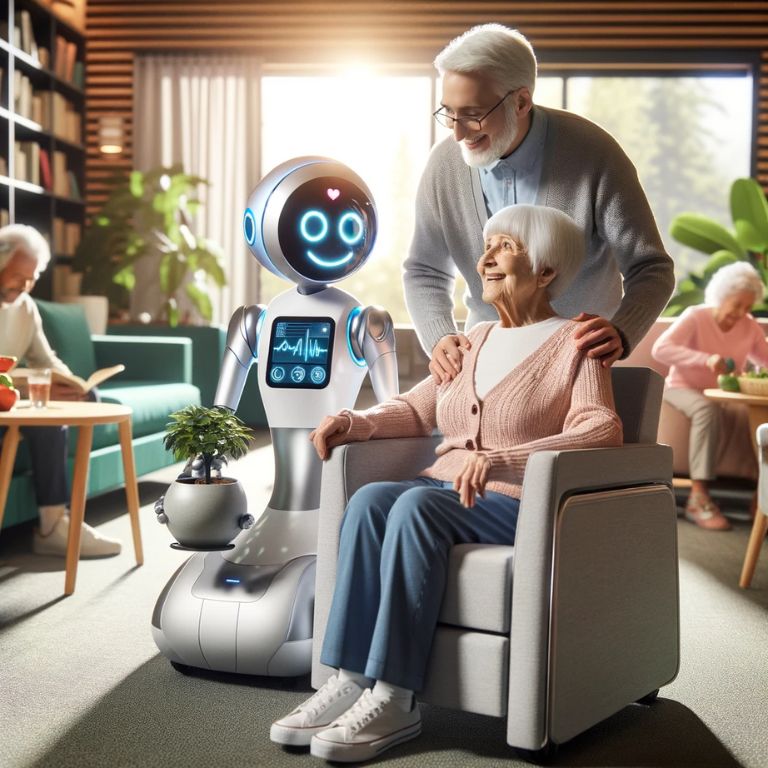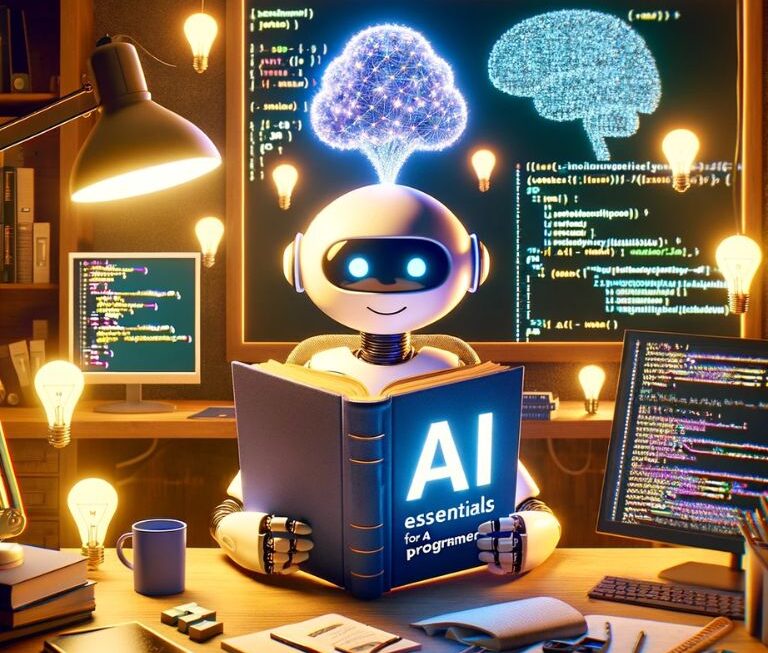As the global population ages, the demand for effective and compassionate elder care solutions is becoming increasingly critical. By 2050, it is estimated that the number of people aged 60 years and older will more than double, reaching nearly 2.1 billion worldwide. This demographic shift presents a unique set of challenges, particularly in healthcare and daily living assistance for the elderly.
The Emergence of AI in Healthcare
In response to these challenges, Artificial Intelligence (AI) has emerged as a transformative force in healthcare, especially in elder care. AI’s ability to process vast amounts of data, learn from patterns, and make predictive analyses is revolutionizing how we approach senior care. Unlike traditional care methods, AI offers a level of personalization and efficiency that was previously unattainable.
How AI Enhances Elder Care
AI technologies in elder care encompass a wide range of applications, from health monitoring and personalized medicine to companionship and safety enhancements. These technologies are not only improving the quality of life for the elderly but are also assisting caregivers in providing better, more efficient care. Let’s delve into some of these groundbreaking applications:
Health Monitoring Systems
AI-powered health monitoring systems are increasingly being used to keep a close eye on the health status of the elderly. These systems utilize wearable devices and sensors to collect data on vital signs, movement patterns, and even sleep quality. This continuous monitoring allows for the early detection of potential health issues, enabling timely interventions.
| Technology | Description | Benefit |
| Wearable Devices | Track vital signs like heart rate and blood pressure | Enables real-time health monitoring |
| Motion Sensors | Monitor movement and activity levels | Helps in detecting falls or unusual inactivity |
Personalized Medicine
With AI, medical treatments can be tailored to the unique genetic makeup and health history of an individual. This approach, known as personalized or precision medicine, is particularly beneficial for the elderly, who often have complex medical needs. AI algorithms analyze patient data to recommend the most effective treatment plans, reducing the risk of adverse reactions and improving outcomes.
Enhanced Daily Living Assistance
AI is also making strides in improving the daily lives of the elderly. Smart home technologies, powered by AI, are enabling seniors to maintain their independence for longer. These systems can automate routine tasks, provide reminders for medication, and even offer interactive activities for mental stimulation.
Personalized Care Through AI
Tailoring Care to Individual Needs
One of the most significant advantages of AI in elder care is its capacity to provide personalized care. As every individual ages differently, personalized care becomes crucial in addressing the unique health and lifestyle needs of each senior. AI’s ability to analyze large datasets enables the development of tailored care plans that cater to the specific needs of each elderly individual.
AI Applications in Personalized Elder Care
AI-Powered Health Assessments
AI systems can analyze an individual’s health data, including medical history, genetic information, and lifestyle factors, to create a comprehensive health profile. This profile assists in identifying potential health risks and devising personalized prevention strategies.
Customized Activity and Diet Plans
Based on health assessments, AI can also generate customized activity and diet plans. These plans consider the individual’s mobility, dietary restrictions, and preferences, ensuring a balanced approach to maintaining their physical and mental health.
Personalized Medication Management
For elderly individuals on multiple medications, AI can optimize medication schedules and dosages, reducing the risk of adverse drug interactions and improving the efficacy of treatments.
Summary of Key Personalized Care Applications in AI
- Health Assessments
- Description: Analyzes personal health data to identify risks.
- Impact: Enables early intervention and preventive care.
- Activity & Diet Plans
- Description: Creates tailored exercise and nutrition plans.
- Impact: Promotes physical and mental well-being.
- Medication Management
- Description: Optimizes medication schedules and dosages.
- Impact: Reduces risks and enhances treatment effectiveness
Examples of Personalized AI Applications in Elder Care
Various innovative AI applications are making a difference in personalized elder care:
- Virtual Health Assistants: These AI-driven assistants can monitor health metrics, provide medication reminders, and even offer companionship, making daily health management easier and more efficient.
- AI in Rehabilitation: For seniors recovering from surgeries or illnesses, AI-enabled devices can track progress in physical therapy and adjust exercises to suit the individual’s recovery pace.
- Cognitive Health Applications: AI programs designed for mental stimulation can help maintain cognitive health, offering personalized brain games and memory exercises based on the user’s abilities and progress.
AI for Health Monitoring and Management
Revolutionizing Health Monitoring with AI
In the realm of elder care, continuous health monitoring is crucial for maintaining the well-being and safety of seniors. AI technologies have significantly advanced this aspect of care, offering innovative solutions for real-time health tracking and proactive management.
Wearables and Sensors for Health Tracking

Wearable devices equipped with AI capabilities are at the forefront of health monitoring. These devices continuously gather data on vital signs like heart rate, blood pressure, and oxygen levels, providing valuable insights into the senior’s health status. AI algorithms process this data to detect any deviations from normal patterns, which could indicate potential health issues.
AI-Driven Data Analysis for Preventive Care
The real power of AI in health monitoring lies in its ability to analyze the collected data and make predictive insights. By identifying trends and anomalies in health data, AI can alert caregivers and medical professionals about potential health risks before they become critical issues. This proactive approach is a game-changer in preventive care for the elderly.
Key Aspects of AI in Health Monitoring
- Wearable Devices
- Description: Continuously monitor vital health metrics.
- Impact: Provides real-time data for early detection of issues.
- Data Analysis
- Description: AI algorithms analyze health data.
- Impact: Identifies trends and anomalies for preventive care.
- Predictive Insights
- Description: AI predicts potential health risks.
- Impact: Enables proactive interventions and improves outcomes.
Examples of AI in Health Management
- Smart Health Watches: These devices not only track heart rate and activity levels but also analyze sleep patterns, contributing to a holistic view of the senior’s health.
- AI-Powered Fall Detection Systems: By monitoring movement patterns, these systems can detect falls and automatically alert caregivers or emergency services, providing a critical safety net.
- Remote Patient Monitoring Platforms: These platforms enable healthcare providers to monitor patients’ health data remotely, allowing for timely medical interventions and reducing the need for frequent hospital visits.
Enhancing Safety and Independence
AI in Home Safety: Fall Detection and Emergency Response
One of the paramount concerns in elder care is ensuring the safety and independence of seniors, particularly in their own homes. AI has made significant strides in this area, particularly in fall detection and emergency response systems. These AI-powered systems are designed to detect unusual movements or falls, immediately alerting caregivers or emergency services, thereby reducing response times and potentially saving lives.
Technologies Aiding in Daily Living and Independence
AI is not just about responding to emergencies; it’s also about enhancing the day-to-day lives of seniors, enabling them to live independently and safely. Smart home technologies, powered by AI, can automate various aspects of home management, making daily tasks easier and safer for the elderly. This includes everything from voice-activated systems that control lighting and temperature to sensors that can remind seniors to take their medication.
Summary of Key Safety and Independence Applications in AI
- Fall Detection Systems
- Description: Monitors for falls and alerts caregivers.
- Impact: Quick response to accidents, enhancing safety.
- Smart Home Automation
- Description: AI-driven systems managing home environment.
- Impact: Eases daily tasks, promoting independence.
- Medication Reminders
- Description: Timely reminders for medication intake.
- Impact: Ensures adherence to medication schedules.
Examples of AI-Enhanced Safety and Independence
- Voice-Activated Assistants: These assistants can control various home functions, provide reminders, and even offer social interaction, reducing the feeling of isolation.
- Automated Security Systems: AI-driven security systems can monitor home entrances and alert seniors or caregivers about any unusual activity, ensuring a safe living environment.
- Robotic Assistance Devices: For seniors with mobility issues, robotic devices can assist with tasks like lifting or moving objects, enabling them to maintain a level of independence in their daily routines.
Social Interaction and Emotional Well-being
AI Companions and Their Role in Emotional Support
Social interaction and emotional well-being are critical components of holistic elder care. As seniors often face challenges like isolation and loneliness, AI technology has stepped in to offer unique solutions. AI companions, whether in the form of robots or virtual assistants, are designed to provide social interaction, emotional support, and even cognitive stimulation. These companions can engage in conversations, remind seniors of important events, and provide a sense of presence that combats loneliness.
Virtual Reality and AI for Social Engagement
Virtual Reality (VR) combined with AI is another innovative approach to enhancing social interaction for the elderly. VR experiences can transport seniors to different environments, enabling them to experience travel, attend virtual events, or simply explore new places, all from the comfort of their home. This technology not only provides entertainment but also stimulates cognitive functions and offers a form of escapism from daily routines.
Key Aspects of AI in Promoting Social Interaction and Emotional Well-being
- AI Companions
- Description: Robots or virtual assistants providing interaction.
- Impact: Reduces loneliness and provides emotional support.
- VR Experiences
- Description: Immersive environments for exploration and fun.
- Impact: Enhances cognitive stimulation and social engagement.
- Cognitive Games
- Description: AI-driven games focusing on memory and skills.
- Impact: Promotes mental agility and provides entertainment.
Examples of AI in Social and Emotional Care
- Interactive AI Robots: These robots can hold conversations, play games, and even recognize and respond to emotional cues, offering companionship and mental engagement.
- Virtual Travel Experiences: AI-powered VR allows seniors to virtually visit places around the world, providing a sense of adventure and new experiences.
- Memory-Stimulating Games: AI-driven games tailored to the cognitive abilities of seniors can help in maintaining and even improving memory and cognitive skills.
Ethical Considerations and Privacy
Balancing Innovation with Ethical Concerns
As AI continues to make inroads into elder care, it brings with it a host of ethical considerations that must be carefully navigated. The primary concerns revolve around ensuring respect for the dignity and autonomy of the elderly, maintaining privacy, and preventing potential biases in AI algorithms. Ethical deployment of AI in elder care requires a comprehensive understanding of these concerns and the development of frameworks to address them responsibly.
Protecting the Privacy of the Elderly in AI Applications

Privacy protection is another critical aspect of integrating AI into elder care. With AI systems collecting and analyzing vast amounts of personal data, there’s an inherent risk of privacy breaches. Ensuring robust data security measures and transparent data handling practices is paramount in maintaining the trust and safety of the elderly individuals relying on these technologies.
Here’s a table summarizing the key ethical and privacy considerations:
| Consideration | Description | Importance |
| Dignity and Autonomy | Respecting the personal choices and independence of seniors | Fundamental for ethical AI deployment |
| Data Privacy | Protecting the sensitive information of the elderly | Crucial for maintaining trust and security |
| Bias Prevention | Ensuring AI algorithms are free from biases | Vital for fair and equitable AI applications |
Examples of Addressing Ethical and Privacy Concerns
- Consent and Transparency: Implementing clear consent processes and providing transparency about how AI systems use and store data.
- Regular Ethical Reviews: Conducting ongoing ethical reviews of AI applications in elder care to ensure they align with evolving standards and societal values.
- Bias Audits for AI Systems: Regularly auditing AI algorithms for potential biases, particularly those related to age, gender, ethnicity, or health status, to ensure fair and unbiased treatment.
The Future of AI in Elder Care
Emerging Trends and Future Advancements
The landscape of elder care is rapidly evolving, with AI at the forefront of this transformation. As technology continues to advance, the potential applications of AI in elder care are expanding, offering promising prospects for improving the quality of life for seniors. Future trends point towards more integrated, intelligent, and empathetic AI systems that can adapt to the changing needs of the elderly population.
The Potential Impact on Quality of Life for the Elderly
The advancements in AI are poised to significantly enhance the quality of life for seniors. From more sophisticated health monitoring systems to AI-driven mobility aids, the focus is on creating a supportive, safe, and engaging environment for the elderly. These advancements are not just about extending life but about enriching the life experience for seniors.
Potential Future Advancements in AI for Elder Care
- Integrated Health Systems
- Description: AI systems that connect various health aspects.
- Expected Impact: Holistic health management and improved care coordination.
- Advanced Mobility Aids
- Description: AI-powered devices aiding in movement.
- Expected Impact: Enhanced independence and mobility for seniors.
- Emotional AI
- Description: AI capable of recognizing and responding to emotional states.
- Expected Impact: Improved emotional support and companionship. Anticipating the Challenges
Anticipating the Challenges
While the future of AI in elder care is bright, it is not without its challenges. It’s vital to provide equal access to technology for the elderly, address the digital divide, and regularly update ethical guidelines. Anticipating and preparing for these challenges is essential for the successful integration of AI into elder care.
AI’s Transformative Role in Elder Care
AI’s role in elder care is transforming the field, offering personalized, efficient, and compassionate care. This technology enhances health management, social interaction, and safety for seniors, promising a safer, healthier, and more fulfilling life. However, integrating AI in elder care presents challenges like ethical considerations, privacy protection, and equitable access. Balancing innovation with responsibility is crucial, ensuring AI aligns with ethical and societal values. Successfully navigating these challenges is key to realizing AI’s full potential in improving senior care.




